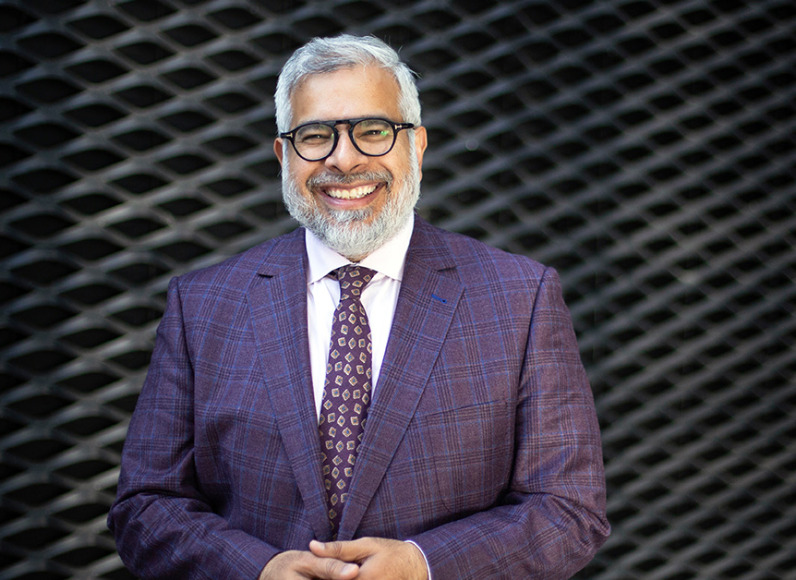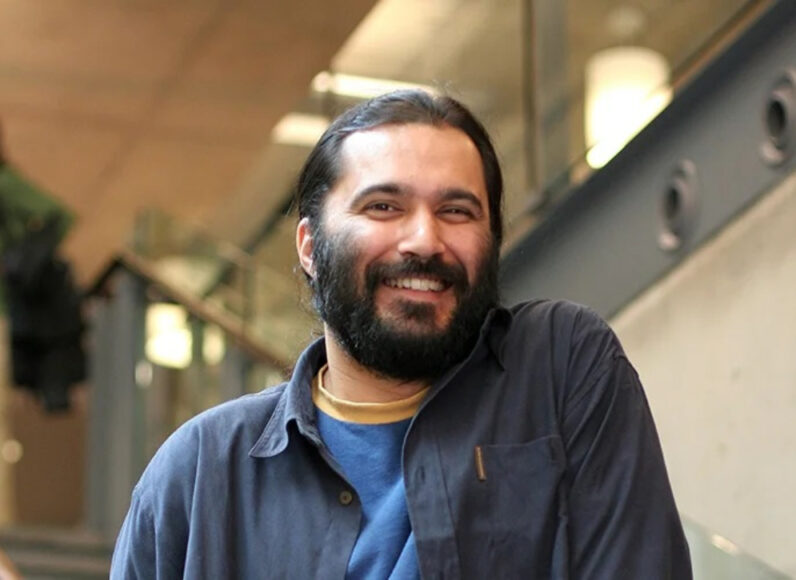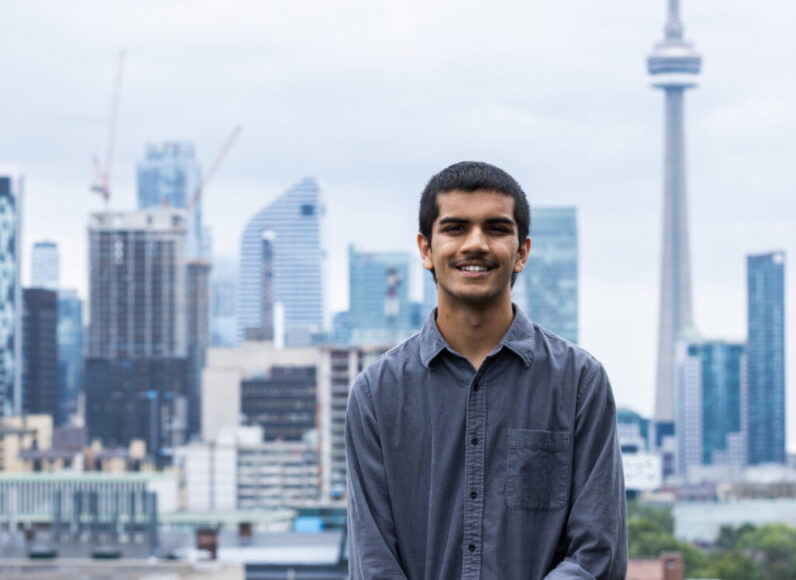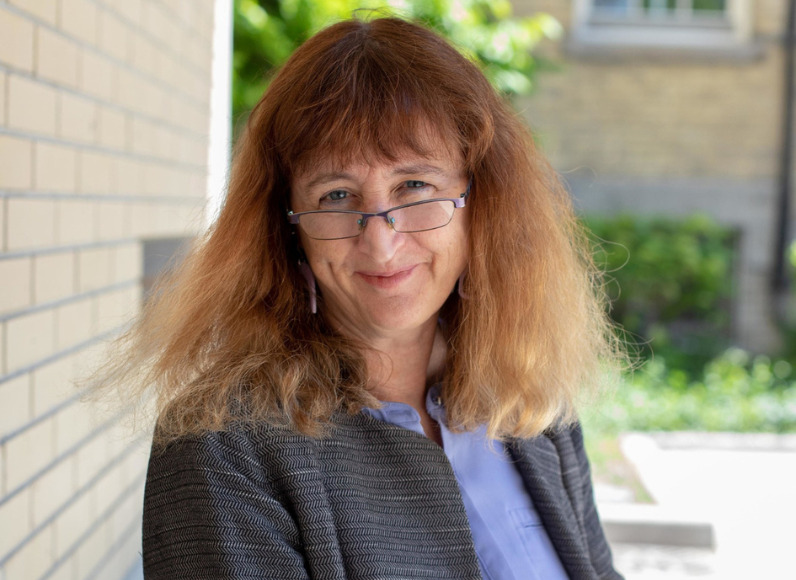The University of Toronto launched The University of Toronto Centre in India today in Mumbai in partnership with Tata Trusts, one of India’s largest philanthropic organizations.
Tata Trusts has been a longstanding collaborator with U of T, supporting researchers across the university to address health care, water, energy and poverty challenges. The centre will give focus to this collaboration with an emphasis on urban research and entrepreneurship, bringing together leading scholars and entrepreneurs from Canada and India to develop groundbreaking research and innovation to benefit people in India and around the world.
U of T President Meric Gertler and Vice-President, International Joseph Wong announced the launch at a roundtable on urban transitions that was held in Mumbai in partnership with Social Alpha, a social innovations accelerator supported by Tata Trusts. The discussion highlighted key challenges faced by Indian cities in their journey towards net-zero emissions, and outlined the role of research-backed deep science innovations in enabling cities to solve for the most pressing environmental challenges of our time.
“The University of Toronto is one of the world’s top-ranked universities with one of the world’s most extensive global research networks – and our faculty are deeply engaged in partnerships with academic and industry leaders here in India and across the globe,” President Gertler said. “The University of Toronto Centre in India will play a vital role in expanding and building on these collaborations, creating new opportunities for scholars and innovators from both Canada and India to share knowledge, collaborate on research and develop solutions to pressing social development and economic challenges.
“We are delighted to partner with Tata Trusts, one of the world’s leading philanthropic organizations, to help further our commitment to growing our global network for learning and innovation.”
As part of the urban research centre, the University of Toronto School of Cities will establish an alliance to build a network of Canadian and Indian researchers who will collaborate on addressing critical urban issues in India and around the world. The entrepreneurship hub, meanwhile, will help connect innovators and entrepreneurs from U of T and India, offering opportunities to share knowledge and resources and providing access to new markets.
“Collaboration for development, and to magnify the effects of innovation has been at the heart of the Trusts’ strategy to bring about sustainable change for communities who need it the most,” said R Pavithra Kumar, Chief Programme Director, Tata Trusts. “This partnership with the University of Toronto and the establishment of The University of Toronto Centre in India will amalgamate new research and innovations with historical knowledge of community engagement to develop skills, address urban environmental and economic issues and develop a model for success that can be replicated across communities in India.”
The centre further deepens U of T’s engagement with India, which includes collaborative research partnerships and mutual opportunities for students, faculty and entrepreneurs. While the centre will not be a satellite campus, Wong said, it will open doors and create opportunities for students, researchers and startups in both countries.
The new centre will be working closely with Tata Trusts and Social Alpha to co-ordinate reciprocal student exchanges and competitions, support emerging startups and develop networks in both innovation ecosystems.
“We look forward to increasing the university’s already strong connections to India,” Wong said. “In addition to our many partnerships and alumni engagement, U of T welcomed more than 2,000 undergraduate and graduate students from India last year, including high-achieving, low-income students through our collaboration with the Karta Initiative, also one of Tata Trusts’ partners. At the same time, more than 300 U of T students travelled to India for academic, research and professional experience over the past five years.
“The centre will help expand on this essential exchange of ideas and expertise.”
“I am pleased to witness the launch of this collaboration between the University of Toronto and Tata Trusts,” said Diedrah Kelly, Consul General of Canada in Mumbai. “The focus on urban research will provide great value to both Canada and India, which will grow into engagement between Indian and Canadian innovators, entrepreneurs and researchers. I look forward to following this initiative and the contributions it makes to the shared goal of sustainable economic growth with environmental consciousness.”
U of T also has an ongoing educational partnership with the Indian Institute of Technology Bombay that includes the Indo-Canadian Entrepreneurship Exchange, an exchange program that aims to develop a two-way innovation talent pipeline. IIT-Bombay’s Centre for Technology Alternatives for Rural Areas has partnered with U of T’s Centre for Global Engineering (CGEN) and the Centre for Technology Alternatives on a joint research effort to tackle pressing issues of sustainable development in India, such as sanitation, nutrition and water supply.
Other key initiatives have included: U of T’s partnership in IC-IMPACTS, the only Research Centre of Excellence dedicated to the development of scientific collaboration between the academic and corporate sectors in Canada and India; the India Innovation Institute at the Rotman School of Management, a hub for researchers focused on how India is using innovation to transform itself; CGEN: The Canada India Initiative on Sustainable Rural Development (CIISRD), a joint multidisciplinary research effort between U of T’s CGEN and the Centre for Technology Alternatives for Rural Areas (CTARA) at IIT-Bombay, which tackles pressing issues of sustainable development in India such as sanitation, nutrition, and water supply; a partnership between U of T, IIT-Bombay and the Pune Smart City Development Corporation Ltd. to find technology-based “smart solutions” for the city of approximately six million; and many more opportunities for collaboration between U of T’s students, faculty and entrepreneurs and those from India.
“As a leader in global engagement, U of T seeks to build bridges to help ensure that life-changing research, knowledge and innovation will have the widest possible impact,” President Gertler said. “The University of Toronto Centre in India will enable the kind of collaboration that can make real change for the better in India and around the world.”
Original story by Tabassum Siddiqui for U of T News









